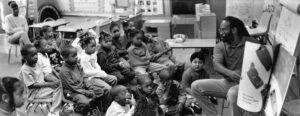Colman McCarthy
- 1998

Fellowship Title:
- Mentoring, Tutoring, and Literacy: The Experience at Garrison Elementary
Fellowship Year:
- 1998
The Third Grade Answer
During a recent visit to a maximum security prison in Virginia, where some 2,000 men are caged, I asked the warden to describe his most troublesome problem. I expected the usual answer – shivs, drugs, rapes, cellblock violence. Sure, he replied, all that is here. But his major problem is illiteracy. As many as 75 percent of the prisoners read at a third grade level. On release, he said, they won’t be able to find even unskilled jobs. Almost two-thirds will return to prison. Not long after this exchange, I was speaking with an early-grade teacher at Garrison Elementary School in Washington’s Shaw neighborhood, one of the city’s poorest. When, I asked, do the Garrison children – nearly all from low-income homes, nearly all black, over 90 percent raised without fathers, all in a school similar to most of the other 109 in D.C. – realize that they are at best marginal, that the negatives in their lives are so many and so heavy that they have almost no chance of making it? When, in
The Genius of One Caring Teacher
Watching the children of Garrison Elementary School enter their cafeteria at lunchtime, it’s no task to identify the students of Mark Lewis. They’re the ones carrying books. Biographies. Short stories. Essays. Poetry. The cafeteria noise and chatter isn’t enough to keep them from reading a page or two of their books in the next half hour. This opportunity for learning at a seemingly inopportune time is one of many signs that the 24 fourth graders of Mark Lewis are responding to his calls to push themselves educationally. At Garrison Elementary—in a poor and working-poor neighborhood a mile north of the White House but a world away economically and politically—the children in Mark Lewis’s class have lucked out. They have a teacher gifted with fire, one who burns with three beliefs: Growing up minority and poor shouldn’t mean growing up hopeless. Children who are long-shots for success have a greater chance to be sure-shots if they enjoy at least one positive educational contact in school—a teacher with energy and ideals—at an early age. For his students,
Mentors Can Mean Magic
Chicago-born and raised, which means a boyhood and then adulthood of rooting for the Cubs, Judge Gregory Mize includes in his celebration of baseball the annual luncheon of the Emil Verban Memorial Society. Last April, some 200 rememberers of Verban gathered at the Capital Hilton in Washington to regale each other with tales–tall and short–about their hapless Cubs and the obscure but good-fielding Emil. A Cub second baseman in the 1940s, Verban was so spectacularly overlooked in his seven big league seasons that it was deemed he should never be forgotten. Gregory Mize, 51, a District of Columbia Superior Court judge since 1990, brought a guest to the luncheon–Quanique Furline, a 10-year-old infielder and fourth grade student at Garrison Elementary School in the Shaw neighborhood of inner city Washington. Judge Mize is her mentor. Also at the table, festooned with Cub mementos and edible miniature chocolate baseball bats, were six other Garrison students, all mentored either by Superior Court judges or court personnel and all members of Elementary Baseball, a literacy and sports program now

True Heroes
Of the 27 faculty members teaching 549 minority students at Garrison Elementary School in the Shaw neighborhood of Washington D.C., two are black males. Darryll Vann has 26 boys and girls in his kindergarten class, Hassan Abdullah 21 in his first-grade class. Darryll Vann is in a shrinking minority group–African-American men who teach youngsters. Only 11 percent of elementary school teachers are male and a much smaller percentage of them are African-American. Photo by David Snider In the educational and moral lives of their children, the two teachers stand, even loom, as much more than educators. They are among the few stable black males with whom the children have consistent contact. Vann and Abdullah are among the few black males regularly delivering gifts of compassion and discipline. The two men are educationally successful, both as teachers and citizens, and enter the doors at Garrison everyday knowing that, for the children, a lot—perhaps everything—is riding on the early elementary years. To the 47 boys and girls in their classes, Vann and Abdullah are the role models
